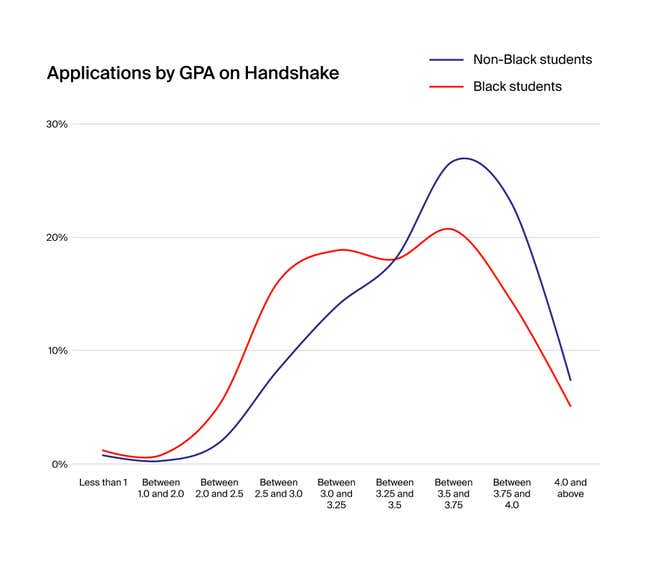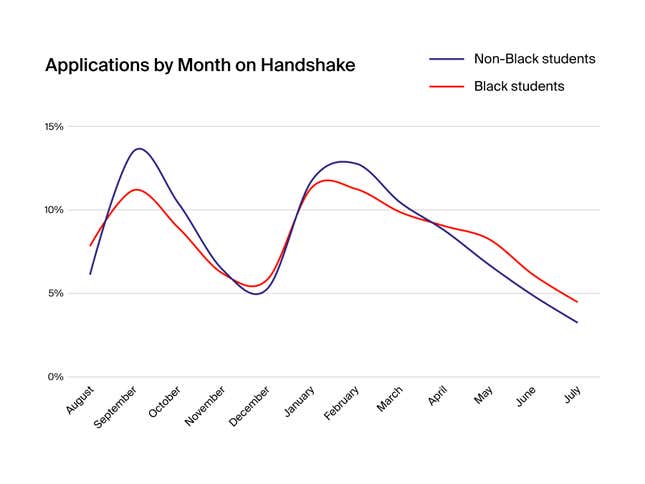Increasing representation of Black employees is a major recruiting goal for companies now, and with good reason. But employers tend to have a lot of discussions about how to find diverse pockets of qualified students without ever thinking about how they’re defining the term “qualified” and, more importantly, why.
To help employers better understand how their hiring practices could be more effective and inclusive, we crunched data from our network of more than 6 million students on Handshake, a hiring platform for university students. These students are affiliated with more than 1,000 schools, including over 170 minority-serving institutions like Historically Black Colleges and Universities (HBCUs), and 150-plus diverse student groups like the National Society for Black Engineers (NSBE).
Our findings show how some very common hiring practices actually disadvantage black students. I’ll focus on three areas in this piece, highlighting mistakes to avoid and new practices to consider as you progress in your hiring processes.
1. Watch out for GPA bias

We found that Black graduates had lower grade-point averages (GPA) than white graduates, which is consistent with figures from the US Department of Education during the 2007-08 academic year: While 75% of white recipients of bachelor’s degrees had a GPA of 3.0 or higher that year, for Black degree recipients, the portion was closer to 55%. Our data reveals that while nearly 6 in 10 of non-Black student applications submitted have a GPA above 3.5, only 4 in 10 Black student applications submitted have a GPA above a 3.5.
If employers filter candidates strictly on GPA criteria, they could unintentionally exclude Black candidates from their recruiting funnel.
Encouragingly, there is an increasing number of job postings on our jobs site that don’t have GPA requirements listed, and employers tell us that they are more interested in additional factors such as job skills, coursework, experience, and extracurriculars to determine qualifications and fit. When Whirlpool reduced its use of GPA as a proxy for skills and potential, for example, the HR team increased the share of underrepresented minority hires from 35% to 40% in one year.
2. Why limit your recruiting “season”?

Looking at the application submission patterns in the above chart, there is a clear difference between Black and non-Black groups. It’s isn’t clear why Black students submit fewer applications during the traditional fall recruiting season, but it is arguably advantageous to extend your application deadlines if you want more of these candidates in your recruiting funnel.
On a broader note, the practices of having a defined recruiting season and recruiting deadlines are waning. Covid-19 has further decreased the reliance on in-person recruiting fairs, while underscoring the benefit of having an online talent engine that engages students whenever they choose to engage.
3. Make salary and benefit details more concrete in job listings
The more information employers can disclose in their job criteria, the more applications they’re likely to receive from Black students. Perhaps because Black students’ parents are less likely than their white counterparts to have college degrees, Black students themselves understand less about the typical compensation packages of professional roles than other populations.
We have found that employers receive:
- 13% more applications from Black students when annual salary is disclosed in the role description
- 36% more applications from Black students when relocation assistance is available
- 2.5 times more applications from Black students are blocked when additional documentation beyond a resume is required (e.g. cover letters, transcripts, etc.)
There are many studies proving that extra steps in a financial or job-application process cause excess friction, and result in fewer completed applications. Our data also shows the value in simplifying the requirements in early stages of the application process.
Some employers may believe that asking for supplementary application material such as cover letters, transcripts, work samples, and letters of recommendation may test a candidate’s commitment and improve the quality of resumes they receive. But our recommendation during any applicant screening process is to save additional requirements for a later stage in the process, so you can optimize the top of the applicant funnel.
I hope that these insights from our data will provide you with a good place to start. Together, we can truly carve the path for democratizing opportunities for all students and leveling the playing field for Black talent.
